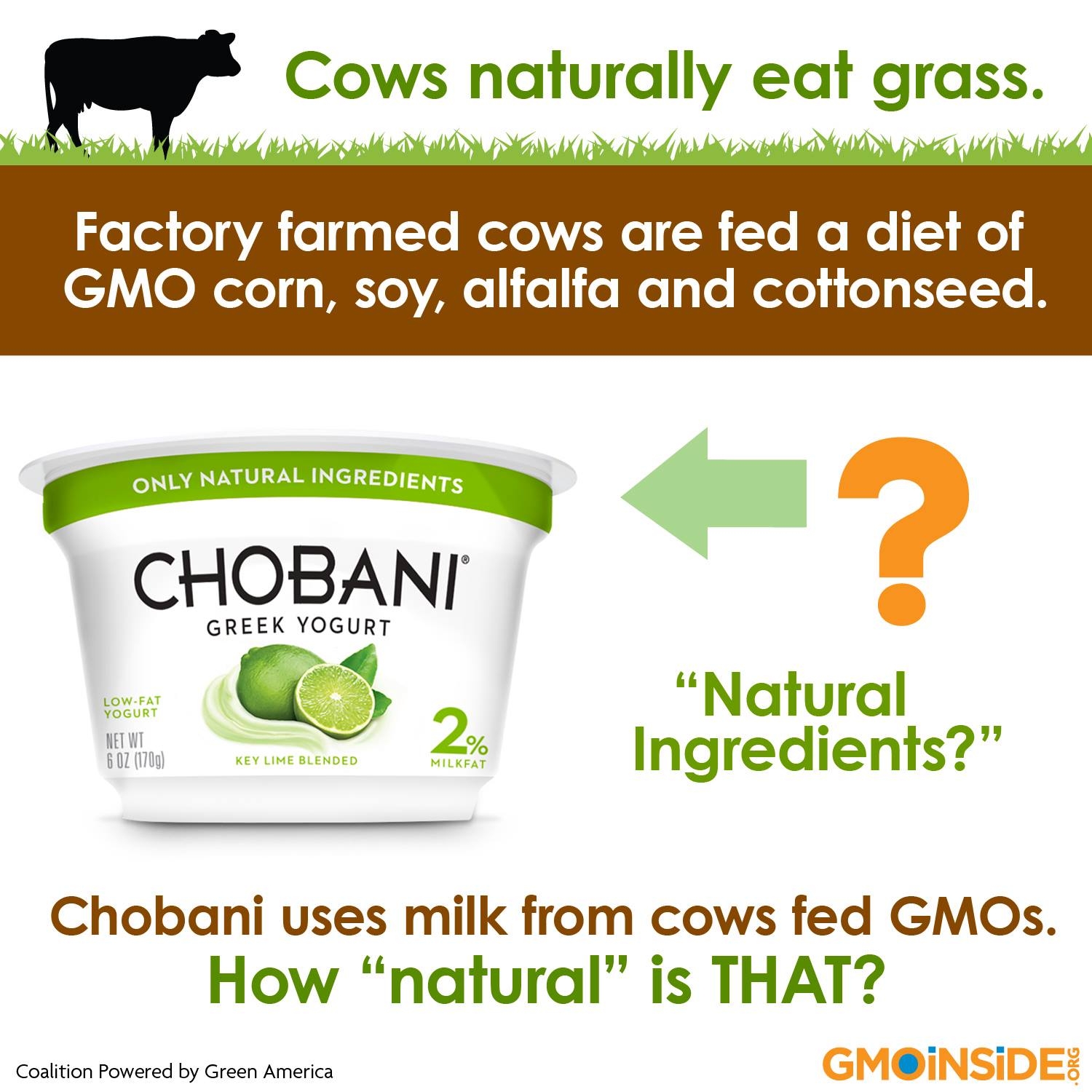 Grocery store aisles across the country are stocked floor to ceiling with yogurt brands, dozens of which fall into the Greek category. So why, amongst all the possible GMO yogurts out there, have we decided to focus our effort on Chobani?
Grocery store aisles across the country are stocked floor to ceiling with yogurt brands, dozens of which fall into the Greek category. So why, amongst all the possible GMO yogurts out there, have we decided to focus our effort on Chobani?
We're glad you asked...
1. Chobani is the biggest, with more than 50% market share in the Greek yogurt sector. A change from Chobani could impact the entire food system.
Being big means a number of things:
1) Chobani is relying on a huge volume of milk coming from GMO-fed cows, an estimated 11 million pounds of milk per day! 2) A shift from a company with this much market share will have huge impacts over time in decreasing demand for GMO animal feed. 3) Being big means a company has responsibility to a greater number of stakeholders, including and not limited to dairy cows, dairy farmers, the environment, the communities in which Chobani operates, and consumers. To be sustainable in the long-run, Chobani needs to take the needs of all its stakeholders very seriously.
2. Chobani is a major player in the dairy sector, which is largely dependent on GMOs.
You can't make yogurt without milk and you don't have milk without cows. (And when it comes to Greek yogurt, we're talking a lot of milk. It takes 3-4 times the amount of milk needed to make Greek yogurt compared to regular). Many of the cows in the US, whether living in industrial farms or smaller farms, are fed corn and other GMO crops. In fact, unless specifically segregated and/or organic, its likely that all animal feed in the US contains GMOs, as a majority of the yields of these crops are genetically modified. Reducing GMOs in the animal feed sector will be hugely important to eliminating GMOs from the food system overall.
3. GMO crops have largely failed to deliver on their intended benefits and instead cause harm to the environment, farmers, and the beings that eat them.
In spite of promising higher yields and reduced needs for pesticides, GMO crop outputs have declined overtime and instead require more and more chemicals to fight off immune "super-weeds" in the fields. GMOs have not been proven safe for human consumption, and no independent, long-term studies have been completed. The research that has been done in animals point to health concerns ranging from inflammation to increasing rates of food allergies. Additionally, the GMO DNA in feed has shown to be taken up by animals' organs and detected in the meat, milk, and fish that people eat.
4. Chobani claims to be made with "Only Natural Ingredients" when it in fact relies on genetically modified crops sprayed with chemicals.
Unlike organic Greek yogurt brands which are actually made without chemicals or unnatural ingredients, Chobani relies on milk from cows that are ingesting feed that has been heavily sprayed with chemicals such as Roundup, or in some cases, these crops even have pesticides and herbicides built into their genetic code, like Bt Corn and Roundup Ready Soy. Animals consuming grains that are sprayed with chemicals are known to have health issues and studies have shown that these pesticides pass through the digestive tracts of cows and into their milk. The same milk that people then consume. So how natural is that?
5. Chobani cares about what its consumers want: healthy food.
Chobani lovers are health conscious and actively pursue healthy choices for themselves and their families. Chobani, like all companies, is sensitive to its consumers' demands. However, Chobani consumers hold the brand in a particular halo because they trust Chobani yogurt to be healthy and good for them. When Chobani consumers learn otherwise, they are shocked and feel empowered to speak out. Individuals, speaking together, have incredible power to make change happen. And because Chobani does strive to be a healthy choice, we think they can be a leader and go non-GMO!
Please join us in calling on Chobani to be a leader amongst food manufacturers by committing to work with its suppliers to find non-GMO feed sources for the cows which supply its milk! Sign our petition!


